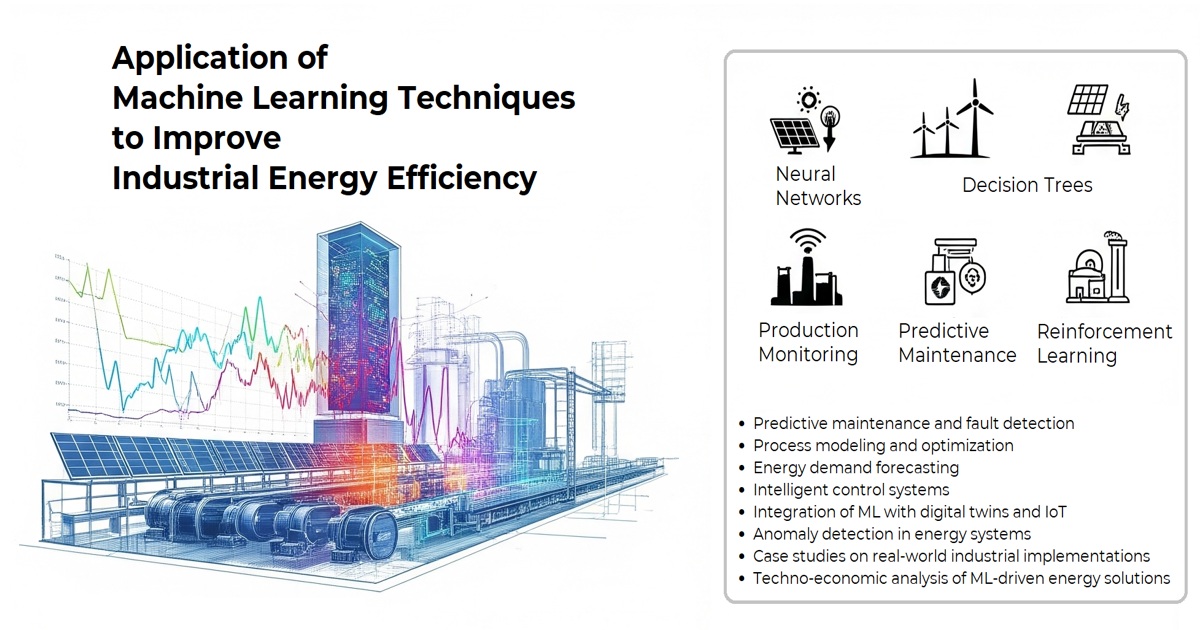Application of Machine Learning Techniques to Improve Industrial Energy Efficiency
A special issue of Processes (ISSN 2227-9717). This special issue belongs to the section "Energy Systems".
Deadline for manuscript submissions: 25 January 2026 | Viewed by 646

Special Issue Editors
Interests: electronic instrumentation; digital signal processing; automation; artificial intelligence; Internet of Things; energies; agroindustry; environment; materials
Interests: machine learning; neuromorphic engineering; computational neuroscience; robotics
Special Issues, Collections and Topics in MDPI journals
Special Issue Information
Dear Colleagues,
With the increasing demand for energy efficiency and sustainability in industrial operations, the application of Machine Learning (ML) techniques has gained significant attention across engineering and manufacturing sectors. ML enables data-driven insights, pattern recognition, and adaptive control strategies that can lead to substantial improvements in energy performance.
This Special Issue, Application of Machine Learning Techniques to Improve Industrial Energy Efficiency, aims to highlight recent developments in the use of ML to optimize energy consumption, reduce waste, and support decision-making in industrial processes. Potential topics include, but are not limited to, methods and/or applications in the following areas:
- Predictive maintenance and fault detection;
- Process modeling and optimization;
- Energy demand forecasting;
- Intelligent control systems;
- Integration of ML with digital twins, IoT, and Edge Computing architectures;
- Anomaly detection in energy systems;
- Case studies on real-world industrial implementations;
- Techno-economic analysis of ML-driven energy solutions.
We welcome contributions that present innovative methodologies, interdisciplinary approaches, and practical applications that demonstrate the potential of ML to transform industrial energy management.
Dr. Alejandro Espinosa Calderón
Dr. Horacio Rostro-Gonzalez
Guest Editors
Manuscript Submission Information
Manuscripts should be submitted online at www.mdpi.com by registering and logging in to this website. Once you are registered, click here to go to the submission form. Manuscripts can be submitted until the deadline. All submissions that pass pre-check are peer-reviewed. Accepted papers will be published continuously in the journal (as soon as accepted) and will be listed together on the special issue website. Research articles, review articles as well as short communications are invited. For planned papers, a title and short abstract (about 250 words) can be sent to the Editorial Office for assessment.
Submitted manuscripts should not have been published previously, nor be under consideration for publication elsewhere (except conference proceedings papers). All manuscripts are thoroughly refereed through a single-blind peer-review process. A guide for authors and other relevant information for submission of manuscripts is available on the Instructions for Authors page. Processes is an international peer-reviewed open access monthly journal published by MDPI.
Please visit the Instructions for Authors page before submitting a manuscript. The Article Processing Charge (APC) for publication in this open access journal is 2400 CHF (Swiss Francs). Submitted papers should be well formatted and use good English. Authors may use MDPI's English editing service prior to publication or during author revisions.
Keywords
- machine learning
- industrial energy efficiency
- process optimization
- predictive maintenance
- intelligent control systems
- energy consumption forecasting
- digital twins
- industrial Internet of Things (IIoT)
- data-driven decision making
- anomaly detection in industrial systems
- edge computing
Benefits of Publishing in a Special Issue
- Ease of navigation: Grouping papers by topic helps scholars navigate broad scope journals more efficiently.
- Greater discoverability: Special Issues support the reach and impact of scientific research. Articles in Special Issues are more discoverable and cited more frequently.
- Expansion of research network: Special Issues facilitate connections among authors, fostering scientific collaborations.
- External promotion: Articles in Special Issues are often promoted through the journal's social media, increasing their visibility.
- Reprint: MDPI Books provides the opportunity to republish successful Special Issues in book format, both online and in print.
Further information on MDPI's Special Issue policies can be found here.






